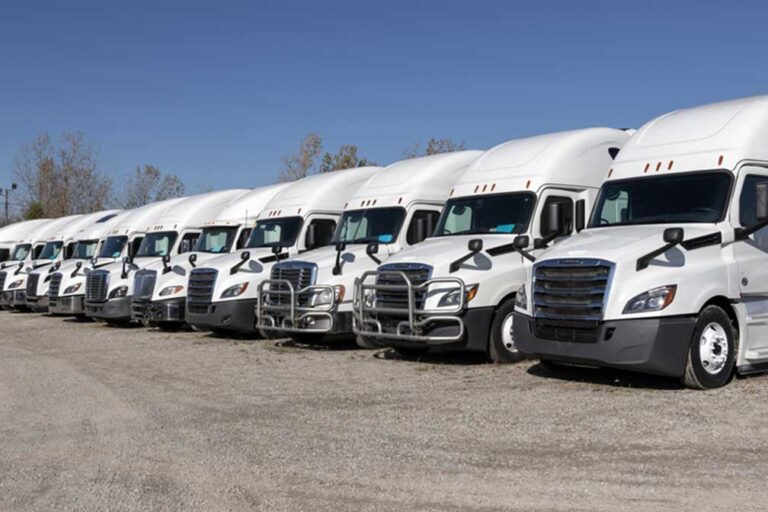In a market where freight rates are suppressed because there are too many available trucks, the trucking industry is responding by (you guessed it!) buying more trucks. Even though truck sales numbers are actually declining somewhat, the oversupply condition is still in play as truck owners attempt to wait out the hard times.
In April, OEMs reported sales of 19,798 new Class 8 trucks, according to data received from Wards Intelligence. That’s an increase of just 140 trucks (0.7%) from March numbers, and it represents a 20.3% decline from sales in April 2023.
Still, the number represents thousands more trucks than carriers need to replace their old equipment.
“We think U.S. tractor replacement is around 11,500 units to 12,000 units,” explained Kenny Vieth, president and senior analyst at ACT Research.
“In two months, we’ve done 14,600 and 14,400,” he continued. “A year ago in March and April, we did 19,800 and 18,300. So, we are making progress, but we think the Class 8 U.S. tractor population is going to continue to grow at least through May on strong sales.”
Vieth believes the slowdown is not happening quickly enough.
“We are seeing a slowdown in in U.S. tractor retail sales, but we’re still not seeing a slow enough slowdown in US tractor retail sales,” Vieth explained. He thinks private fleets are responsible for the continued momentum in tractor sales.
“Private fleets have been continuing to add capacity into a disastrous for-hire market, or they’re exacerbating a soft freight environment because they’re taking loads out of the for-hire market,” he said. “And that seems to be unchanged.”
Because private fleets haul mostly their own products, rather than “taking” freight from the for-hire carriers they may simply not be offering as many loads to brokers as they were a couple of years ago. Some, however, use the spot market for backhaul loads or even to keep their fleets busy until production picks up.
Many of the companies that have private fleets got burned in the freight frenzy of 2021 and 2022. Carriers, busy hauling freight from the spot market at record rates, offered fewer trucks to their dedicated customers. Competition for trucks was intense on load boards and at brokerages, and manufacturers paid dearly to have their product hauled — if they could find a carrier to haul it at all.
In response, manufacturers increased the size of their own private fleets.
“CEOs were saying, ‘You know, we need to add some capacity to our fleet to make sure that we don’t get caught out again,’” Vieth said. “I think a lot of private fleets all came to this same decision: The CEO greenlighted capacity expansion, in the middle of the freight recession in 2023.”
Another potential reason for strong Class 8 sales is the stronger emissions standards the Environmental Protection Agency has scheduled to roll out in 2027. Unsure of how the new technology will impact fuel mileage and truck reliability — and to avoid the expected $30,000 per truck price increase — carriers are expected to buy extra trucks in the years prior to the 2027 model year. Pre-buying will increase in the 2025 and 2026 model years, but some could already be happening.
Orders for new Class 8 trucks declined in April but ran ahead of orders from a year ago for the third time in 2024. According to FTR Transportation Intelligence, 14,000 new Class 8 trucks were ordered in April. That’s a drop of 28% from March orders — but still 12.5% higher than April 2023.
“The persistent stagnation in the freight markets has not deterred fleets from being willing to order new equipment,” said Dan Moyer, FTR’s senior analyst for commercial vehicles. “Order levels were below the historical average but remain in line with seasonal trends, and we still expect a replacement level of output by the end of 2024.”
On the used truck side of the Class 8 market, ACT analysts reported that sales fell 6% in April from March numbers and were down 4% from April 2023 figures. The good news for buyers is that, on the average, used truck prices were down 3% from March and a full 20% from April a year ago. The age and mileage of the average used Class 8 truck both fell in April, too.
The issue many buyers will face in buying trucks is that interest rates have risen dramatically. Those who can afford the payments will need to deal with tightened credit requirements, too. Lenders, still reeling from defaults and repossessions during the buying periods in 2021 and 2022, are more wary of extending credit.
The individual truck manufacturers experienced a mixed month.
Freightliner’s 6,483 Class 8 trucks sold led the market but was down 10.1% from March. The company held 39.4% of the new Class 8 market as of April 2023, but this year it’s fallen to 37.1%.
Freightliner’s Western Star may be at the other end of the sales spectrum, but it’s increased its April sales to 889 — a 10.3% increase over March and a nice 45.7% climb over April 2023 numbers. The company has increased its share of the Class 8 market from 2.5% as of last April to 4.5% this year.
Navistar’s International brand has gone in the opposite direction. April sales of 1,938 were just 0.4% lower than March sales — but a whopping 53.3% behind sales in April 2023. For the year to date, the company is nearly 4,900 trucks behind its 2023 pace for a decline of 39.2%. Navistar has seen its share of the market fall from 14.2% to 10%.
Volvo has taken advantage of International’s drop in sales, with Volvo beating Navistar with a 10.1% share of the Class 8 market; that’s up from 9.8% at the same point of last year. Volvo’s April sales of 2,037 were 1% better than March but 11.9% lower than April 2023.
Volvo sibling Mack gained 10.7% in April with sales of 1,536 but was 11.1% behind April 2023 sales. The company currently holds 6.5% of the 2023 market.
Kenworth edged out sibling Peterbilt in April, selling 3,581 trucks for a 14% increase over March and a 6.6% increase over April 2023, good for 15.9% of the 2023 market. Peterbilt’s 3,319 sold was up 5.7% over March but down 3.3% from April 2023. The companies each hold 15.9% of the 2024 Class 8 market.
Only time will tell if this year’s decline in sales numbers will be enough to bring a balance between capacity and available freight to a depressed freight market.
Cliff Abbott is an experienced commercial vehicle driver and owner-operator who still holds a CDL in his home state of Alabama. In nearly 40 years in trucking, he’s been an instructor and trainer and has managed safety and recruiting operations for several carriers. Having never lost his love of the road, Cliff has written a book and hundreds of songs and has been writing for The Trucker for more than a decade.














